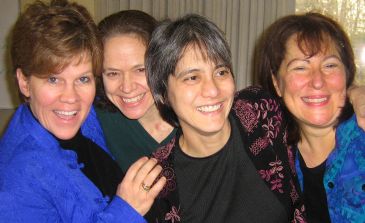|
Symphony
FROM THE NEW WORLD TO THE OLD WORLD
by Peter Lert
Saturday, June 14, 2025
Chamber
MC2 DUO RECITAL CLOSES 222'S SEASON
by Terry McNeill
Saturday, June 14, 2025
Choral and Vocal
CANTIAMO SONOMA'S LUSCIOUS A CAPELLA SINGING IN SEASON ENDING CONCERT
by Pamela Hicks Gailey
Sunday, June 8, 2025
Symphony
SRS SEASON ENDS WITH RESOUNDING TA-TA-TA-BANG
by Terry McNeill
Sunday, June 1, 2025
Symphony
YOUTHFUL VIRTUOSITY ON DISPLAY AT USO'S MAY CONCERTS
by Peter Lert
Saturday, May 17, 2025
Symphony
MYSTICAL PLANETS AND LIVELY GERSHWIN ORTIZ AT FINAL SRS CONCERT
by Peter Lert
Sunday, May 4, 2025
Symphony
VSO'S CONCERT MUSIC OF TIME, MUSIC OF PLACE
by Peter Lert
Sunday, April 27, 2025
VOCAL ELEGANCE AND FIRE AT THE 222'S RECITAL APRIL 26
by Pamela Hicks Gailey
Saturday, April 26, 2025
CANTIAMO SONOMA SINGS AN INSPIRED GOOD FRIDAY MOZART REQUIEM CONCERT
by Pamela Hicks Gailey
Friday, April 18, 2025
DRAMATIC SHOSTAKOVICH SYMPHONY CLOSES PHILHARMONIC'S 25TH SEASON
by Terry McNeill
Sunday, April 13, 2025
|
 |
 Dawn Harms, Anna Kruger, Thalia Moore and Roxanne Michaelian at Oakmont |
INSTRUMENTAL EQUALITY IN JAN. 14 OAKMONT CONCERT
by Terry McNeill
Thursday, January 14, 2010
Innovative but not necessarily exciting programming characterized the Kirkwood Piano Quartet’s Jan. 14 performance in Oakmont’s Berger Auditorium.
Unfamiliar works were perhaps the reason for an audience count far less than the usual Oakmont Concerts Series event, and the Kirkwood played a first half of rarely-heard music: Bridge’s one-movement “Phantasy” and a Stanford Quartet in F Major, Op. 15. The dreamy Bridge, from 1911, has many contrasting sections with echoes of late Faure. The playing was lovely, idiomatic and made the most of the subtle duos of viola and cello. The textures were homogeneous, right up to the deft arpeggios from pianist Roxanne Michaelian at the conclusion.
Charles Villiers Stanford is remembered mostly for choral works, though Oakmont resident and Stanford expert Harry Fry reminds associates that the English composers of the Victorian era were successful in other genres. The 1879 Quartet featured harmonies reminiscent of Brahms and Rubinstein, and the bucolic opening allegro con brio was richly played, the themes traded with clarity between violinist Dawn Harms and cellist Thalia Moore. Ms. Harms’ tone can be thin at the top, but Ms. Moore has an exceptionally sonorous bottom register, spacious and frequently doing the voice leading chores. This was especially apparent in the long and lush adagio movement, the Kirkwood catching the majesty of the writing with hints of Elgar. The concluding allegro was spirited, Brahmsian in the lower registers, the piano never covering the other instruments.
It was a fluent if not a particularly powerful reading, and the music must have been novel for just about everyone in Berger. Not so for the familiar Quartet in E-Flat Major, Op. 47, of Schumann, that closed the program. Here all was in place and the Kirkwood’s interest in a blended instrumental texture foremost. Tempos seemed right throughout and the famous andante cantabile saw each player having a chance at the nostalgic and opulent main theme. Mid way through this glowing and vocal movement violist Anna Kruger took up the theme with Ms. Moore in a poignant melodic statement, every note expressive.
Without pause the finale began, quick fugal-like sections ending quickly. Here again the Kirkwood favored equality of sound over fervor, the reading fluent and beautiful without ever raising the audience’s temperature. There was no encore.
|

